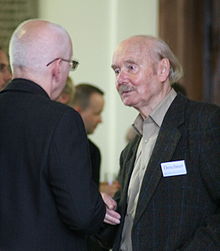Karlheinz Deschner
| Karlheinz Deschner | |
|---|---|

Karlheinz Deschner (right) in conversation with Hans Albert
|
|
| Born |
Karl Heinrich Leopold Deschner 23 May 1924 Bamberg, Germany |
| Died | 8 April 2014 Haßfurt, Germany |
| Nationality | German |
| Education | University of Würzburg |
| Occupation |
Writer Critic of the church and of religion |
| Spouse(s) | Elfi Tuch |
| Children | 3 |
Karl Heinrich Leopold Deschner (23 May 1924 – 8 April 2014), was a German researcher and writer who achieved public attention in Europe for his trenchant and fiercely critical treatment of Christianity in general and the Roman Catholic Church in particular, as expressed in several articles and books, culminating in his 10 volume opus Christianity's Criminal History (Kriminalgeschichte des Christentums, Rowohlt Verlag, Reinbek).
Deschner's father Karl was a forester in Bamberg, Bavaria. His mother, Margareta Karoline (née Reischböck) grew up in Franconia and Lower Bavaria. Both of them were Roman Catholics, but the mother converted from Protestantism at some point.
Karlheinz, the eldest of three children, attended elementary school in Trossenfurt (close to Würzburg) from 1929 to 1933. Afterwards he attended the Franciscan Seminary in Dettelbach. There he first lived with the family of his godfather and sponsor, the clerical councilor Leopold Baumann, afterward in the Franciscan monastery. From 1934 to 1942 he attended the Alte, Neue and Deutsche Gymnasium as a boarding school student with the Carmelite and English Sisters. In 1942 he passed his final exams. Like the rest of his entire class he reported immediately as a military volunteer and was wounded several times. He served as a soldier until Germany's capitulation, in the final stages as a paratrooper.
Initially matriculating as a major in Forestry in the University of Munich, Deschner attended lectures on Law, Theology, Philosophy and Psychology during 1946/47 at the Philosophical-Theological College in Bamberg. From 1947 to 1951 at the University of Würzburg he studied Contemporary German Literature, Philosophy and History and graduated in 1951 with a doctoral dissertation entitled Lenau's Lyrics As an Expression of Metaphysical Despair. In the same year he married Elfi Tuch. They had three children: Katja (1951), Bärbel (1958) and Thomas (1959 to 1984).
...
Wikipedia
